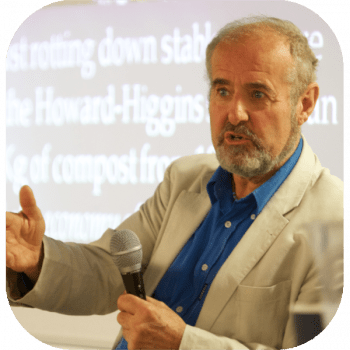We now offer the cheapest Rock Dust in the UK
As of this sunny morning here in Wales we are now offering the cheapest Volcanic Rock Dust in easy to carry bags in the UK.
Creating a closed-loop system of food growing and dry sanitation.



To establish a closed-loop fully sustainable system of highly nutritious food growing, without the use of chemicals, for the children of the school and to set up a productive (fertiliser) DRY sanitation system to avoid polluting their drinking water from pit latrines.
For the total number of persons on this site, 55, we propose to install two HH-3 DRY toilets after capping off any existing toilet system be it pit latrines or septic system.
Only one set of HH-2 will be necessary to digest this amount of waste and produce our optimum fertiliser.
All the kitchen waste, household waste and garden waste can be collected to fuel the system with a small amount of rice straw that may be found locally and brought to the school.




Further Developments
Train other schools/make and sell the valuable HH-4 fertiliser/soil conditioner that prevents all manner of diseases in the staple crops of the world. These include Black Rust in wheat, Yellow Rust in wheat and Stem Rust in wheat. This programme will empower the school to sell the excess fertiliser and receive a commission from promoting sales of the HH-2 system.
History & Inception
The Stiching Peters Primary School, a Dutch based Non-governmental Organization who role is to address the challenges of education and agriculture in Eastern Uganda was founded in 2005 with the goodwill and passion of Joan Machora and Peter Kruidenie. It lies in the Jinja region of Eastern Uganda. In 2008 the funding of the school was drastically reduced due to the European financial crisis that affected the Dutch partners. The school started admitting both orphans, whose education is free, and students who are able to pay fees so that the operational costs of the school would be met
Sustainability & Agriculture
In addition, the school has been practising farming to reduce the cost of food and to help educate farmers in the community. The HH-2 System actually prevents pests and diseases from devastating crops without having to buy any chemical fertilisers, pesticides and herbicides etc., It is an essential element in the push for increased food security for Africa.
In 2015 the school also opened a Nursery school for children below 7 yrs.
Connections
The story of this project began in 2012 when Richard Higgins, Director of Good Gardeners International, was contracted by Norgesvell to do a scale up project of this HH-2 sanitation and waste management system in Kampala. At that time he surveyed four other larger schools. All the schools he surveyed wanted to adopt the HH-2 Horticultural System with DRY sanitation and grow their own food. All the schools surveyed had large amounts of land but were buying everything from markets in the town. Food security is increased by more people growing more food on the vast areas of uncultivated land. It is the simplest agricultural/horticultural system there is and as such anyone can operate it without conventional agricultural training.
More people in Africa send their children to school in Uganda than any other country in Africa. And Uganda has been coined as the possible bread basket for many other countries.
Then on a subsequent exploratory survey mission in summer 2015 with Brendan Greene (20 years in Africa), we connected with Joan Machora. After discussion with Joan, Richard Higgins, CEO of Good Gardener’s Intl and Brendan Greene, set off to Eastern Uganda to survey her school.
Currently, there are 630 pupils and staff at this school, and most of them are boarders. We plan to install the Good Gardeners, HH-3, DRY toilets that will serve the staff and all the pupils and the HH-2 Horticultural System that will enable them to replenish their soil which will greatly increase their food security and the nutritional content of their food. It is a fact that the soils of Africa are much depleted and this is the cause of malnutrition.
The Assessment
We surveyed the school in order to assess what would help them most. GGI observed that many schools in Uganda have a problem with not being able to supply a fully balanced, nutritional diet because they cannot afford the chemicals with which to defeat the ongoing pests that attack the leafy green vegetables. As a result, this component is often lacking from their diet. This problem needs to be addressed so that the children from a young age can grow up with full cognitive development. The Good Gardeners initiative to carry out this work across Uganda is fully supported by The Institute of Brain Chemistry (London).
The GGI surveys so far have concluded that the dumping of human effluent into the ground (pit latrines) is a major cause of groundwater pollution and can cause contamination of drinking water. Therefore in the first instance, they wish to install their HH-3 DRY toilet system at Peters School which prevents drinking water from getting polluted. Also, their HH-2 waste disposal units are rat proof and fly proof and digest all the waste collected and turn it into valuable pathogen-free fertiliser in a 90 day period. Besides pit latrines causing pollution to groundwater – rats and flies are the greatest spreaders of disease. (World Health Organisation).
The Operational Process
GGI wishes to convert the existing toilet blocks to accommodate their DRY HH-3 toilet units. These work in conjunction with our specially insulated HH-2 units. Together these two will promote safe drinking water and safe waste disposal thus giving a healthier environment for the children. The system processes all forms of sanitation waste, in conjunction with all the garden and kitchen waste generated in the school. The HH-2 Horticultural System makes all these wastes into an optimum fertiliser in 90 days which is so powerful it actually prevents all kinds of pests and disease when used in the HH-2 growing system as it does on our demo farm in South Hertfordshire, England.
Over the fifty years that the Good Gardeners have been trialling the no-dig system of growing they have had no serious pests or disease in any of their crops. This is due to the consistency and reliability of the fertilising end product known as HH-4. The plants are provided with such a high state of nutrition that pests and diseases just don’t attack them. Sir Albert Howard, the originator of this science, said that pests and disease were indicators that something was wrong with the fertility of the soil and that something had to be done to improve it. The HH-2 system is that solution as it generates the right fungi and bacteria that enable fully healthy crops to develop.
Once the system is installed and the staff trained in the operation of the new toilets and the horticultural growing system (no dig) other schools can come and learn how this will be possible for them to adopt.
Future Planning
The work the Good Gardeners Charity is performing is essential for the establishment of sustainable food security. Joan along with Good Gardeners Intl plans to spread the word outwards and affect change in other communities. Once funding is secured for this project, they can also set up as a centre for training other schools with the Good Gardeners solution for sustainable sanitation, good waste management and pest and disease-free crop production.
The Carbon Footprint
The HH-2 Horticultural System that employs all manner of crop and household wastes are transformed into an optimum fertiliser in 90 days. No nitrogen is lost and being applied to the ground without digging or ploughing it achieves maximum carbon sequestration. This no dig system is the most effective carbon sequestration system. This will qualify such schools as having a carbon negative footprint and could
attract government awards, funding or subsidy.
Funding Required
£46,317.

As of this sunny morning here in Wales we are now offering the cheapest Volcanic Rock Dust in easy to carry bags in the UK.
BBC Farming Today exposes the scandal of contaminated salad crops in the UK. Simple answer: Don’t use raw manure to produce your salad crops or
BBC Farming Today 8.6.24 ‘Don’t cut down all your surrounding weeds, nettles, vegetation etc, These are the home of hover flies an other pollinators.’ At
| Cookie | Duration | Description |
|---|---|---|
| cookielawinfo-checkbox-advertisement | 1 year | The cookie is set by GDPR cookie consent to record the user consent for the cookies in the category "Advertisement". |
| cookielawinfo-checkbox-analytics | 11 months | This cookie is set by GDPR Cookie Consent plugin. The cookie is used to store the user consent for the cookies in the category "Analytics". |
| cookielawinfo-checkbox-functional | 11 months | The cookie is set by GDPR cookie consent to record the user consent for the cookies in the category "Functional". |
| cookielawinfo-checkbox-necessary | 11 months | This cookie is set by GDPR Cookie Consent plugin. The cookies is used to store the user consent for the cookies in the category "Necessary". |
| cookielawinfo-checkbox-others | 11 months | This cookie is set by GDPR Cookie Consent plugin. The cookie is used to store the user consent for the cookies in the category "Other. |
| cookielawinfo-checkbox-performance | 11 months | This cookie is set by GDPR Cookie Consent plugin. The cookie is used to store the user consent for the cookies in the category "Performance". |
| elementor | never | This cookie is used by the website's WordPress theme. It allows the website owner to implement or change the website's content in real-time. |
| viewed_cookie_policy | 11 months | The cookie is set by the GDPR Cookie Consent plugin and is used to store whether or not user has consented to the use of cookies. It does not store any personal data. |
| Cookie | Duration | Description |
|---|---|---|
| mailchimp_landing_site | 1 month | The cookie is set by the email marketing service MailChimp. |
| Cookie | Duration | Description |
|---|---|---|
| _ga | 2 years | This cookie is installed by Google Analytics. The cookie is used to calculate visitor, session, campaign data and keep track of site usage for the site's analytics report. The cookies store information anonymously and assign a randomly generated number to identify unique visitors. |
| _gat_gtag_UA_203491877_1 | 1 minute | This cookie is set by Google and is used to distinguish users. |
| _gat_UA-203491877-1 | 1 minute | This is a pattern type cookie set by Google Analytics, where the pattern element on the name contains the unique identity number of the account or website it relates to. It appears to be a variation of the _gat cookie which is used to limit the amount of data recorded by Google on high traffic volume websites. |
| _gid | 1 day | This cookie is installed by Google Analytics. The cookie is used to store information of how visitors use a website and helps in creating an analytics report of how the website is doing. The data collected including the number visitors, the source where they have come from, and the pages visted in an anonymous form. |
| CONSENT | 16 years 4 months | These cookies are set via embedded youtube-videos. They register anonymous statistical data on for example how many times the video is displayed and what settings are used for playback.No sensitive data is collected unless you log in to your google account, in that case your choices are linked with your account, for example if you click “like” on a video. |
| Cookie | Duration | Description |
|---|---|---|
| IDE | 1 year 24 days | Used by Google DoubleClick and stores information about how the user uses the website and any other advertisement before visiting the website. This is used to present users with ads that are relevant to them according to the user profile. |
| test_cookie | 15 minutes | This cookie is set by doubleclick.net. The purpose of the cookie is to determine if the user's browser supports cookies. |
| VISITOR_INFO1_LIVE | 5 months 27 days | This cookie is set by Youtube. Used to track the information of the embedded YouTube videos on a website. |
| YSC | session | This cookies is set by Youtube and is used to track the views of embedded videos. |
| yt-remote-connected-devices | never | These cookies are set via embedded youtube-videos. |
| yt-remote-device-id | never | These cookies are set via embedded youtube-videos. |
| yt.innertube::nextId | never | These cookies are set via embedded youtube-videos. |
| yt.innertube::requests | never | These cookies are set via embedded youtube-videos. |
| Cookie | Duration | Description |
|---|---|---|
| cookies.js | session | No description available. |
| wp_woocommerce_session_7ef5404579515d013e9154529f907a7f | 2 days | No description |